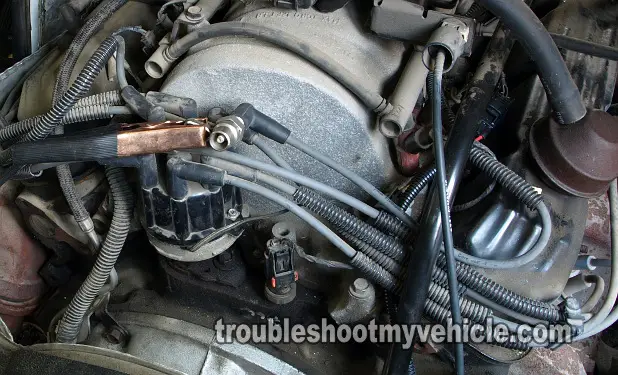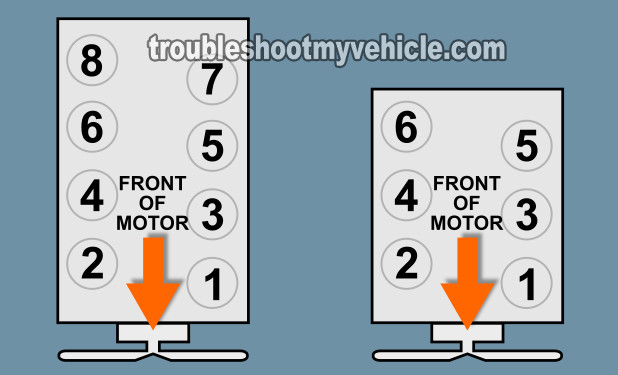
Troubleshooting misfire codes (P0300, P0301, P0302, P0303, P0304, P0305, P0306, P0307, P0308) can be a challenge. In this article, I'll shed some light on the basic causes of a misfire condition on the Dodge 3.9L, 5.2L, and 5.9L equipped pick ups, full-size vans, and SUVs.
Contents of this tutorial:
ES ![]() You can find this tutorial in Spanish here: Cómo Probar Fallas De Cilindro (Chrysler 3.9L, 5.2L, 5.9L) (at: autotecnico-online.com).
You can find this tutorial in Spanish here: Cómo Probar Fallas De Cilindro (Chrysler 3.9L, 5.2L, 5.9L) (at: autotecnico-online.com).
What Is A Misfire Condition?

In plain English, a misfire condition, means that the engine in your Dodge pick up, van, or SUV is not running on all cylinders.
When this happens, whether you have a 3.9L V6 or one of the V8 engines in your Dodge pick up (or Van, SUV), you'll notice some of the following consequences (symptoms):
- The check engine light will be on to let you know that you're not imagining the engine is running rough or missing.
- One or more misfire codes (P0300-P0308) will be stored in your pick up's PCM memory.
- P0300 Random Cylinder Misfire.
- P0301 Cylinder #1 Misfire.
- P0302 Cylinder #2 Misfire.
- P0303 Cylinder #3 Misfire.
- P0304 Cylinder #4 Misfire.
- P0305 Cylinder #5 Misfire.
- P0306 Cylinder #6 Misfire.
- P0307 Cylinder #7 Misfire.
- P0308 Cylinder #8 Misfire.
- Sometimes, even tho' the engine is suffering a bonafide misfire, no misfire codes are registered in the computer's memory and/or no check engine light (CEL) on.
- Lack of power upon acceleration.
- Smell of unburned gas exiting the tail pipe.
- Rough idle and may stall.
- Cranks but does not start.
- Will not pass the emissions tests.
- Bad gas mileage.
Although it sucks that your Dodge pick up (or van, SUV) is misfiring, the cool thing is that troubleshooting the misfire is not that hard to do. Let's find out more.
What Causes A Misfire Condition?
What helps, to successfully diagnose a misfire code or misfire condition is to know some of the root causes of a misfire. Why? Well, because quite a few things can cause and engine to misfire.
Now don't worry, I won't go into a lot of technical detail, just the stuff you and I need to know to troubleshoot the misfire issue.
The most important thing you need to know is that each cylinder needs three things to produce power and they are: air, fuel, and spark. And when your Dodge vehicle is misfiring, it's because one of them is missing from the equation. OK, let's go into more detail:
Ignition System: The ignition system is responsible for the production and delivery of spark. In my opinion, around 90% of the time, a fault in the ignition system is usually behind a misfire.
The usual suspects (that cause a misfire) are:
- Spark plugs.
- Spark plugs that are too worn.
- Spark plugs with broken ceramic insulators (usually broken while installing them during a tune-up or when a hot engine is power washed).
- Carbon fouled spark plugs due to the engine burning oil.
- Spark plug wires.
- Spark plug wires that are burned (from touching the exhaust manifold).
- One or two spark plug wires that stop transmitting spark due to age.
- Distributor cap.
- It's common for one or two towers to stop transmitting spark to the spark plug wire when the cap isn't replaced at a regular maintenance interval.
Fuel System: The fuel system is responsible for the delivery of fuel. If fuel is missing from any one specific engine cylinder, it will misfire. The most common type of failure is a fuel injector going on permanent vacation.
Sucks that fuel injectors don't last forever and when one ‘kicks the bucket’, the cylinders who gets fed by it will go dead and in the process cause a misfire code to light up the check engine light.
Here are some other fuel system problems that can cause a misfire (‘dead’ cylinder, rough idle, etc.):
- PCM (Powertrain Control Module).
- The PCM can go bad and can stop activating one or more fuel injectors.
- Electrical ‘open-circuit’ problem.
- What usually happens is that the wiring harness starts to rub against a hard edge. This rubs off the wires' insulation, leading to an open or short-circuit to Ground.
Engine Mechanical Condition: The pistons and valves are the ones that draw air into the engine. Sometimes you'll have one cylinder or several whose pistons or valves have accelerated wear and tear. This causes those cylinders to produce a less than average compression value that will cause a misfire condition.
Another thing that will cause a misfire (normally at idle) is vacuum leaks coming from a large vacuum hose or the intake manifold gasket.
